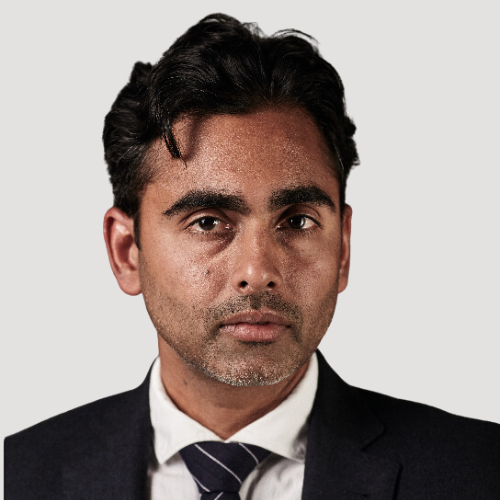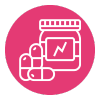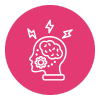- Select
- Addiction
- Rehab Treatment

Written by:

Medically Reviewed by:
Last Updated:
January 22nd, 2025
Stimulant Addiction Treatment
Stimulant addiction can turn the dream of relief from tough medical symptoms into a daily living nightmare. At Banbury Lodge, we have helped many people suffering from prescription drug addiction to different stimulants, and we are well aware of the challenges they face. If you are in the same boat, you must understand there is a tried and tested path to recovery. Our comprehensive stimulant addiction treatment programme can help you bring your life back into balance and plan a brighter, more hopeful future.
Am I in need of stimulant addiction treatment?
Stimulant prescriptions, particularly for ADHD, have reached records in the UK, and this widespread use can make it hard to know whether you have become dependent on the medicine that was supposed to help you. If you are reading this page, you may already have an inkling that there is an issue, but here are some questions to ask yourself which could help confirm the need for professional help:
- Is acquiring and using stimulants taking up most of my thoughts, time and energy?
- Am I using more stimulants than I was supposed to, according to my prescription?
- Am I using stimulants not just for my medical condition but to help me get through the day?
- Have I lied to my friends, family or doctor about my stimulant use?
- Do I go into stimulant withdrawal when I reduce my dose or try to quit?
Answering “yes” to these questions is a clear sign that you need stimulant addiction treatment. Here is how treatment works at Banbury Lodge:
Phase one: Stimulant detox
When you have been taking stimulants in large quantities and over a long period, your body becomes saturated with the drugs. Eventually, your brain gets so used to high levels of stimulants in your system that it begins to believe that it needs them to function normally.
When you then stop taking stimulants, your body and mind can react strongly as they adjust to their sudden absence. This adjustment period is known as stimulant withdrawal, and it produces symptoms that you have probably experienced if you have tried to quit before.
At Banbury Lodge, we provide a medically supervised stimulant detox to help you through this phase safely. Our experienced medical team will monitor your health closely and provide support to ease stimulant withdrawal symptoms.
What can I expect from stimulant withdrawal?
Stimulant withdrawal symptoms can vary somewhat based on your physical health, how much stimulant you have been using, which type and how long you have been using them. However, there are some common stimulant withdrawal symptoms that we often observe at Banbury Lodge, which include:
- Fatigue and lethargy
- Depression and low mood
- Increased appetite
- Sleep disturbances
- Stimulant cravings
- Anxiety and irritability
These are generally straightforward to manage but there are potentially more dangerous stimulant withdrawal symptoms that could arise. They include:
- Severe depression and suicidal thoughts
- Paranoia and hallucinations
- Extreme agitation or aggression
- Heart problems
- Seizures
These symptoms are rare and only usually occur in the most severe cases of dependency. However, Banbury Lodge has extensive experience in managing these severe symptoms and we provide medical care, emotional support and appropriate medications to help you through this challenging phase.
How long does it take to detox from different stimulants?
Ritalin Rehab
Ritalin rehab at Banbury Lodge combines evidence-based therapies with holistic practices to address the deeper issues behind your Ritalin use.
Adderall Rehab
Our Adderall rehab programme addresses the emotional and psychological aspects of dependency, providing a safe space for healing and growth.
Focalin Rehab
Focalin rehab provides a structured approach to overcoming dependency with therapies that target all the different causes and triggers of your Focalin use.
Ritalin
Ritalin withdrawal symptoms typically begin within 24 to 48 hours after you stop using it with the most intense symptoms usually peaking around the third to fifth day. For most people, the acute withdrawal phase lasts about a week, but some symptoms like moodiness or insomnia may linger on for a few weeks afterwards.
Adderall
Withdrawal from Adderall often starts within hours to a day after the last dose and peaks between days two and five. Acute symptoms generally subside after a week, but again, some people may experience ongoing issues like mood swings or difficulty concentrating for a few weeks to a month.
Focalin
Focalin withdrawal can begin within a day of stopping the drug, with the most intense symptoms peaking around the middle of the first week. As with the other stimulants, while most symptoms resolve within a week, some people may experience lingering effects for a few weeks after.
Phase two: Stimulant rehab
One of the biggest reasons people fail with recovery, even if they successfully complete detox, is that they don’t address the underlying causes of their stimulant use. Stimulant rehab aims to do just that with therapies, support groups and wellness approaches that focus on healing not just your body but your mind and spirit as well.
Banbury Lodge provides proven prescription drug rehab programmes for several stimulants, including:
Ritalin rehab
Ritalin rehab at Banbury Lodge combines evidence-based therapies with holistic practices to address the deeper issues behind your Ritalin use.
Adderall rehab
Our Adderall rehab programme addresses the emotional and psychological aspects of dependency, providing a safe space for healing and growth.
Focalin rehab
Focalin rehab provides a structured approach to overcoming dependency with therapies that target all the different causes and triggers of your Focalin use.
What can I expect from stimulant rehab in Banbury Lodge?
At Banbury Lodge, we believe that true recovery from stimulant addiction requires an intensive, comprehensive approach which helps you heal on every level. That’s why we combine traditional therapies with holistic practices to create a well-rounded treatment plan.
Here’s what you can expect from the different types of therapy we offer:
Dialectical-behavioural therapy (DBT)
Dialectical Behavioural Therapies (DBT) helps you identify the negative thoughts and behaviours that keep you stuck in stimulant use. Together, we’ll work to change those patterns by building skills like emotional regulation and distress tolerance, giving you the tools to stay strong and maintain sobriety.
Group therapy
In group therapy, you will connect with others who are going through similar struggles. It is a safe space to share your story, listen to others and realise you’re not alone in this journey.
Individual therapy
These one-on-one sessions are your chance to dig deeper into the personal issues that led to your dependency. Your therapist will help you uncover what’s really going on and guide you toward healthier ways of coping.
Mindfulness and meditation
Learning to stay present and calm without relying on substances is key to sustained recovery. Mindfulness and meditation help you manage stress and keep your emotions in check, making it easier to handle life’s challenges.
Aftercare and relapse prevention planning
This is almost the third phase of treatment, though it is designed to help you after you leave Banbury Lodge. First, we will help you create a solid plan to stay on track once you return home from rehab which will include identifying your triggers and making sure you have a strong support system in place. After that, we will then provide you with one year’s free outpatient group therapy every week so you can stay connected to our recovery community and get help whenever you need it.
Begin stimulant addiction treatment today
Banbury Lodge’s multi-phase stimulant addiction treatment programme is designed to help you break free from stimulants and build a brighter future. With our compassionate care and holistic approach, you will receive the support you need to heal on every level. Contact us today to start your journey to recovery and discover a life of balance and well-being.







